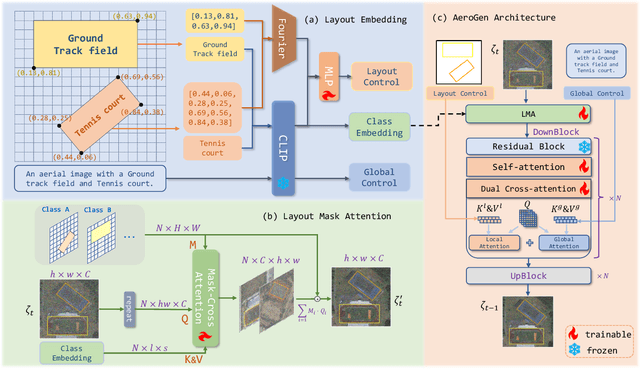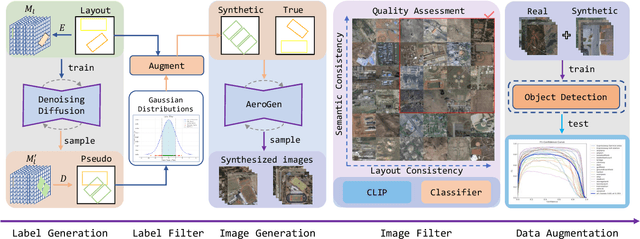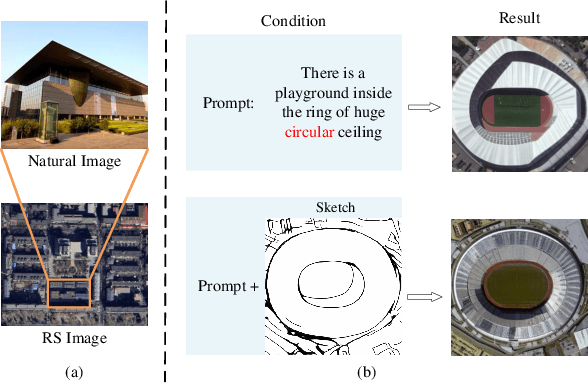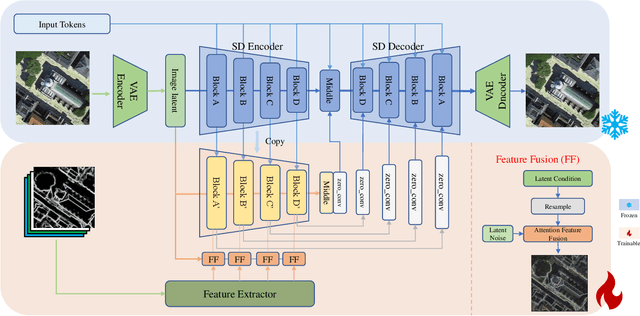Datao Tang
AeroGen: Enhancing Remote Sensing Object Detection with Diffusion-Driven Data Generation
Nov 26, 2024



Abstract:Remote sensing image object detection (RSIOD) aims to identify and locate specific objects within satellite or aerial imagery. However, there is a scarcity of labeled data in current RSIOD datasets, which significantly limits the performance of current detection algorithms. Although existing techniques, e.g., data augmentation and semi-supervised learning, can mitigate this scarcity issue to some extent, they are heavily dependent on high-quality labeled data and perform worse in rare object classes. To address this issue, this paper proposes a layout-controllable diffusion generative model (i.e. AeroGen) tailored for RSIOD. To our knowledge, AeroGen is the first model to simultaneously support horizontal and rotated bounding box condition generation, thus enabling the generation of high-quality synthetic images that meet specific layout and object category requirements. Additionally, we propose an end-to-end data augmentation framework that integrates a diversity-conditioned generator and a filtering mechanism to enhance both the diversity and quality of generated data. Experimental results demonstrate that the synthetic data produced by our method are of high quality and diversity. Furthermore, the synthetic RSIOD data can significantly improve the detection performance of existing RSIOD models, i.e., the mAP metrics on DIOR, DIOR-R, and HRSC datasets are improved by 3.7%, 4.3%, and 2.43%, respectively. The code is available at https://github.com/Sonettoo/AeroGen.
CRS-Diff: Controllable Generative Remote Sensing Foundation Model
Mar 25, 2024



Abstract:The emergence of diffusion models has revolutionized the field of image generation, providing new methods for creating high-quality, high-resolution images across various applications. However, the potential of these models for generating domain-specific images, particularly remote sensing (RS) images, remains largely untapped. RS images that are notable for their high resolution, extensive coverage, and rich information content, bring new challenges that general diffusion models may not adequately address. This paper proposes CRS-Diff, a pioneering diffusion modeling framework specifically tailored for generating remote sensing imagery, leveraging the inherent advantages of diffusion models while integrating advanced control mechanisms to ensure that the imagery is not only visually clear but also enriched with geographic and temporal information. The model integrates global and local control inputs, enabling precise combinations of generation conditions to refine the generation process. A comprehensive evaluation of CRS-Diff has demonstrated its superior capability to generate RS imagery both in a single condition and multiple conditions compared with previous methods in terms of image quality and diversity.
 Add to Chrome
Add to Chrome Add to Firefox
Add to Firefox Add to Edge
Add to Edge